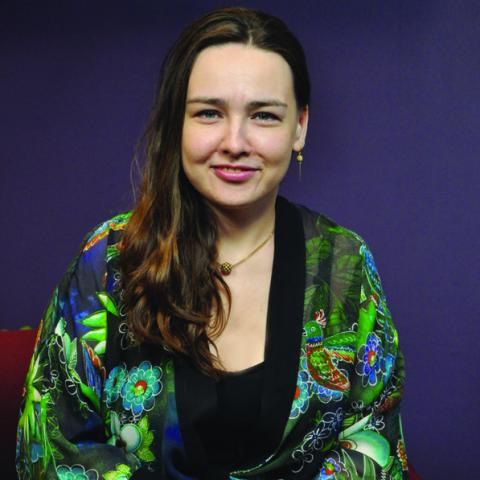Faculty Profile: Elena Roussanova Lucas

Assistant Professor Elena Roussanova Lucas
Phil Farnsworth
When an editor at Warner Brothers Publications asked composer and arranger Elena Roussanova Lucas to write a piece based on Russian folk music, she was pleased—and surprised. A child prodigy who began studying the piano at age three, Lucas is an honors graduate in composition from the prestigious Moscow P.I. Tchaikovsky Conservatory of Music in Moscow, her Russian hometown.
Lucas was not surprised that the publisher asked for a folk-based piece until she was told that she had only two days to finish before the recording session. While she was attending the Texas Music Educators Association Convention at the time, Lucas spent the next 48 hours in her San Antonio hotel room composing “Harvesting the Fields of Russia.” The piece later received an award in the Editors Choice category by the J.W. Pepper & Sons Inc. and earned best-seller honors. That was in 2001, and Lucas has since undertaken many additional projects for Warner Brothers and Alfred Music Publishing. She’s written works for orchestra, string orchestra, and wind ensemble and had her music performed by ensembles throughout America.
“You just have to do it,” says Lucas, who is an assistant professor in Berklee’s Composition Department. “You have inspiration, you do it. You don’t have inspiration, you do it.”
It was at the Moscow Conservatory where Lucas first heard that Berklee was the place to study all varieties of contemporary music. Lucas—who since 2005 has taught harmony and counterpoint classes at Berklee—describes the college as “the one place on earth where you can be completely open to any inspiration. You have the amazing [freedom] to do what you want to do.”
Building Bridges
Lucas recently played a key role in launching a partnership between Berklee and the Moscow Conservatory. Several years in the making, this collaboration began in 2007 with a conversation between Lucas, Composition Professor Julius Williams, and President Roger Brown, who noted the college’s desire to connect with talented young musicians in Russia and suggested an exchange program between the two schools. Lucas contacted her former teacher at the conservatory, Alexander Koblyakov, who heads the composition department. Together they developed an exchange involving Berklee’s composition and film scoring faculty members and the Tchaikovsky Conservatory’s composition faculty. In the fall of 2008, the first of several Berklee visits to Russia took place.
In May, Senior Vice President for Academic Affairs/Provost Lawrence Simpson signed the official agreement of cooperation with the Tchaikovsky Conservatory. During that visit, Julius Williams conducted the world premiere of Lucas’s three-movement symphonic work Moments of Arrival in the conservatory’s historic concert hall. “Nothing,” insists Lucas, “can compare to the feeling of hearing your music.”
Moments of Arrival will be recorded with the Prague Radio Symphony Orchestra in November 2010 for an Albany Records CD, which is slated for a 2011 release.
The piece opens with intimations of falling raindrops and ends with a musical portrayal of the bright morning of a new day. Appropriately, Lucas’s own travel experiences inspired her. Her teaching emphasizes that inspiration can be found everywhere. “You can be inspired by a conversation with a friend or a wonderful view. You can feel music on all sorts of different levels,” says Lucas, who tries to compose every day, even if she can complete only two measures.
Her fascination with music began when, as a toddler, she heard Mario Lanza on television. Amazed by the sound of his voice, she started conducting with a knitting needle she grabbed from her mother. Her appreciation for different musical genres also began at an early age, when her favorites were the jazz-rock groups Blood, Sweat & Tears and Chicago.
“There is a craftsmanship there; they are trained musicians,” she says of Chicago. She cites the group’s impressive harmonic progressions and use of counterpoint. “If you are going to write a song, you have to have an extra line. Any good piece of music will have counterpoint.” When teaching the numerous rules of counterpoint that often chafe young music students, Lucas tells them, “To break the rule, you have to know the rule.”
Lucas’s writing incorporates a variety of genres and styles ranging from symphonic music to Broadway and pop. Although she is classically trained and a member of the prestigious United Russian Composers Union, she’s comfortable with all sorts of work and finds that her attitude fits well at Berklee. She maintains that her students like hearing classical music, even if their personal style is much different.
Lucas loves writing music despite—or maybe because of—the forced creativity required by looming deadlines. Her tightest deadline gave her only 40 minutes. At the time, Lucas forgot her best friend’s request for her to write something for the birthday of an elderly tai chi teacher. Lucas was reminded of her promise the morning of the celebration. All she had to go on was that the teacher loved to dance the waltz. “I started thinking, Chinese, waltz, pentatonic, Chinese paintings of butterflies and peonies,” she recalls. Lucas went to her piano and came up with “Butterfly and Flowers,” a sweet and flowing waltz that she ultimately sold to her music publisher as a work for string orchestra geared toward high-school ensembles.
“For musicians, it is all about opportunity,” Lucas says. “You have to be prepared for opportunity, for the open door. I tell my students, never treat [a composition] as an exercise. Always put yourself into it. You never know what opportunity you will have later on.”
Mary Hurley is a grant writer in Berklee’s Office of Institutional Advancement




